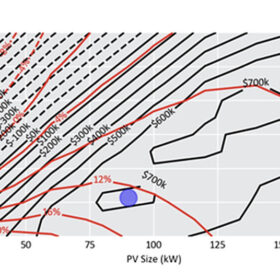Optimizing off-grid PV systems for different design criteria
A new report by IEA PVPS Task 18 provides a blueprint guide on how to conduct feasibility studies for off-grid and edge-of-grid power systems. The optimal system size and specifications vary depending on the client’s priorities. The desired project outcomes can be identified using pure financial analysis (NPV, IRR) or additionally taking environmental performance into account.
Pumped hydro key to meeting storage demand
Pumped hydro energy storage can be readily scaled to any required storage capacity at a known and affordable cost.
Union Budget 2023: Mainstreaming flexible and resilient grids
While the current policy regime supports the adoption of flexible resources like batteries, grid flexibility and resilience require more focus and a range of calibrated efforts, including due acknowledgment as a sector priority and robust planning at the central and state level. The upcoming union budget provides an opportunity for the government to develop flexible and resilient grids.
Is floating solar PV the future?
The major impediments to floating solar photovoltaics (floatovoltaics) are the high cost of materials and the complex installation involved.
Solar in 2023
Here are three trends in the solar sector that will gain momentum in 2023, leading to wider PV implementation.
How low-light solar cells can decarbonize your home
With the latest generation of household devices increasingly connected and internet-of-things (IoT)-enabled, dye-sensitized solar cells can finally realize their latent promise and help reduce the carbon footprint of billions of manufactured goods.
How Indian businesses are growing with ESG
Today, following the ESG (environmental, social and governance) mandate is more than just ticking off a box in the compliance checklist. It is taking ownership of the consequences of the businesses and working towards creating a positive impact by partnering with the right groups.
COP27 was a crucial step forward for hydrogen – here’s why
Three import deals signed by the EU at Sharm El Sheikh during this month’s COP27 summit show the European Union is serious about harnessing green hydrogen for its heavy industry, and about distributing the fruits of the energy transition on an equitable basis.
Catalyzing energy transition in rural MSMEs through rooftop solar
Solutions for catalyzing rooftop solar in the rural commercial and industrial market have to be looked at in terms of geographic clusters. This allows for the aggregation of demand, making it easy to run awareness campaigns in a targeted manner.
Mobilizing green finance for Indian MSMEs
In the absence of immediate viable financial solutions, MEMEs (micro, small and medium enterprises) need government intervention to get sustainable debt at a reasonable rate. A way forward could be a green finance platform for MSMEs.















